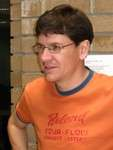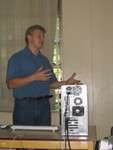Travelling Developer Roadshow (Southern Africa)
The purpose of this page is to share the learning and inspire future events of this nature which may build on the learning and make a positive impact on society via ICT in education (or other important fields). If you are suitably inspired, be sure to include hands-on Learning4Content workshops.
The Open Society Institute (OSI) and OSISA in collaboration with the CSIR Open Source Centre (later incorporated into the Meraka Institute) and Aspiration Tech convened the first Travelling Developer Roadshow in Africa: Southern Africa at the University of the Western Cape, 6-10 December 2004.
Contents
Introduction
The first African Travelling Developer Roadshow for Free/Libre and Open Source Software Developers from around Africa took place at the University of the Western Cape (UWC) from 6-10 December 2004. The venue was the UWC's new BOE IT Lab, which was sponsored by the BOE Educational Foundation, and is hosted by the Free Software Innovation Unit (FSIU) of UWC's Information and Communication Services. The FSIU pursues excellence in the development and application of free software mainly for higher education in Africa.
The event was a “great opportunity to share ideas and experiences, and gain some practical experience while also creating a useful software product (e.g. Kewl.NextGen, etc.) ...” (Melisse Benn, FSIU).
The CSIR/UWC collaboration highlights our common commitment to FLOSS principles and practices, towards African sustainable development through addressing civil society needs.
The primary purpose of the event was to facilitate interaction and knowledge sharing among African software developers and users with real needs representative of the African context.
This document provides an overview of the activities and highlights.
Preparation and Arrivals
The coordinator arrived on the preceding Thursday to ensure preparations at the venue were in order, and to install GNU/Linux in the laboratory. Eventually, we had 12 x Fedora 2, 12 x Mandrake 10, 6 x SUSE 9.1, and the rest Ubuntu. The latter proved most popular during the week.
Delegates started arriving on the Friday and over the week-end, mostly on Sunday 5/12.
Key learning: ensure good communication among all team members regarding arrival times of delegates. Check and double check to ensure they are all met at the airport and taken to their residence. Ensure all involved have each others cell phone numbers.
Programme Highlights and Activities
This section captures some of the week's highlights in more or less chronological order.
Morning Circle
The first day was essentially scene-setting with our animator starting us off with a “Morning Circle” - fun activities to get people interacting and thinking about important issues such as free vs proprietary software, Python vs Java, agile and traditional methodologies, etc. Most days started with such activities and continued in the impressive UWC BOE Lab.
International Perspective
Perspectives from Finland were provided by four guests from Finland (sponsored by the Embassy of Finland in South Africa). Finland is regarded as a leading nation in terms of e-learning and knowledge management technologies. Sessions included:
- a presentation on the current status of FLOSS in Finnish schools & society,
- a discussion on how open source development could contribute to developing increased usage of IT, lead to society benefits, and promote use of open source educational software as a preferred option leading to wider benefits
- technical presentations on Zope, Fle3 and Extreme Programming and “capability-based security”.
The issues faced in Finland with respect to open source adoption are remarkably similar to those in South Africa (e.g. raising awareness, capacity building, dealing with FUD tactics of proprietary software companies, ...), though the contexts and approaches to addressing the issues is somewhat different. Nevertheless, it was clear that there are opportunities for collaboration between Africa and Finland.
Translation
Dwayne Bailey, translate.org.za, gave us an update on progress with translations of OpenOffice, parts of KDE, Mozilla, etc. and chaired a session on technologies for multi-lingual applications.
Kewl.NextGen and Kinky2
Derek Keats updated us on progress with KewlNextGen (Knowledge Environment for Web Learning Next Generation) and KINKY (Kinky Is Not Kewl Yet). He inspired some of the developers to take an interest and to attend a Kewl developers workshop early in January.
Design Patterns
Another highlight of the week was the Design Patterns workshop by Dr Heinz Kabutz (Java Specialist). We were most privileged to have Heinz come and give this session on the Wednesday morning. This was the most advanced software development session of the week. It was well attended, even by non-technical people who found it fascinating to watch what makes geeks tick, and to gain some insight as to why there is such a communication chasm.
Jabber
Stephen Marquard joined us on the Tuesday afternoon and gave us a chance to jabber and chat about Jabber – an instant messaging protocol – and brainstorm ways of using this protocol in education/ e-learning. The Kewl team have since had at least one follow-up session with Stephen, and intend using Jabber for
some collaboration features in Kewl.NextGen.
Focus groups
As the Roadshow started to take form, three focus groups emerged which worked diligently throughout the rest of the week to produce some interesting outputs/outcomes:
- Education-in-a-Box
- Evaluating GNU/Linux Distributions
- Python/Zope/Plone/Fle3 and localisation
Education-in-a-Box
This later became known as Education out of the Box and was followed up in West Africa as "Navigation Scheme".
Evaluating GNU/Linux Distributions
Neil Blakey-Milner led the “Distros” group who came up with the scheme in "Distro Roundup" to evaluate distributions for use in education-related contexts – such as Developer Roadshows.
See DistroWatch for an update on what distros are now available.
Python/Zope/Plone/Fle3 and localisation
This group was inspired by the following presentations and discussions:
- “Python” by Neil Blakey-Milner
- “Zope and Plone” by and Etienne Labuschagne, and
- “Fle3, Localisation and Extreme Programming and ” by Tarmo Toikkanen.
This team inspired many developers present to consider this suite of technologies for future attention. Localisation of Fle3 into several African languages (Afrikaans, Bemba, Shona, Setswana and Yoruba) has started. The task proved considerably more time consuming than originally estimated.
Afrikaans reached about 80% completion, and the other languages close to 50%.
The Kewl team created a web service exposing the database behind Kewl permitting clients, potentially written in Python, to access the service and provide value-addition such as custom types of usage statistics, etc. Although this was not followed up at the Roadshow, the opportunity is there for such development in future.
Entertainment
Finally, on the Thursday evening, to consolidate any bonding among participants that may have happened so far, symbolic of the uniting drums of Africa, we participated in a drumming workshop. In the space of an hour the participants were drumming together as if rehearsed for months.
Tour of the TuxLabs
On day 4, we took a break from the laboratory for a TuxLabs tour.
Two schools (AZ Berman and Silverstream Primary) were visited, and time in between was spent in a shopping mall in the vicinity. The tuXlab team of volunteers, lead by Hilton Theunissen and Thomas Black, showed us what they do: deploy computers with open source software in schools according to a well thought out methodology. The trip was worthwhile for the visitors from other countries who may like to duplicate the approach.
Update: when The Shuttleworth Foundation's Go-Opensource campaign ended in 2005, the tuXlab project, which had installed GNU/Linux in more than 200 schools in South Africa, changed form. Subsequent learning may be found via Inkululeko.
On account of skillful facilitation and animation by Gunner (Aspiration) and the enthusiasm of the presenters and helpers, all present participated with passion and enthusiasm.
Summary of Outputs/Outcomes
The event itself was an output. Here we briefly list products of the event and possible follow-up actions.
Distributions Round-up
- An approach to evaluating distributions with nine evaluated. The ratings are tentative, but the approach may be re-used.
Education-in-a-Box
- A description of the contents of a set of CDs for education and knowledge sharing in communities with limited bandwidth.
- Inspired by the Tactical Technology Collective's “NGO in a Box”, one possibility is to establish a project in collaboration with the Tactical Technology Collective, possibly as part of the Free Knowledge Communities initiative.
Update: The suggestions were incorporated into FLOSS4Edu's Tools etc. list. The idea was taken further in West Africa as “Education out of the Box” (see also). A possible new approach is being developed via WikiEducator (and similarly in Wikipedia) via features enabling users to create books or collections of resources in PDF and other formats.
Fle3 Translations
- Several translations into African languages have started. This exercise may continue at successive Roadshows and in between, or via independent processes if there is sufficient interest. The results may be included in the relevant CD sets of Education out of the Box.
Jabber
- Use of Jabber in Kewl.NextGen and other projects on collaboration is being pursued by the UWC with Stephen Marquard.
Free Software Developers Workshop
Some of the attendees learned of a Free Software Developers workshop at the FSIU in January and attended.
Kewl and Progressive Inquiry
During a visit to South Africa for a pedagogy workshop in February, Tarmo's boss, Teemu Leinonen, visited Derek Keats to discuss various e-learning topics. As a result of this discussion, Derek may introduce support for Progressive Inquiry, a learning paradigm supported by Fle3, into Kewl.NextGen.
Coordination Meeting – Developer Roadshows Africa
On the last day, a coordination meeting was held involving the guests invited from East and West Africa. The purpose was to brainstorm hosting similar events in other regions. Notes on this meeting were posted on EduForge. The follow-up action was for the attendees to prepare suggestions on hosting future events in their own regions.
At the time of writing (February 2005), we await responses.
Update: for East Africa, efforts were diverted into AfricaSource 2. A roadshow was held in Ghana in 2006.
Update: guidelines for convening and facilitating such events.
Acknowledgements
Thanks are due to all the participants whose enthusiasm made the event a success, to Derek Keats and the UWC for their administrative support and for facilitating our use of their excellent BOE Laboratory. The photographs were taken by Marcus Sundman, Walter Kaba and Neil Blakey-Milner. Finally, thanks to our funders, OSI and OSISA, for making the event possible, and to the Embassy of Finland for sponsoring the participation of Riikka, Esa, Tarmo and Marcus.















